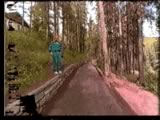| michael naimark |
|
|
|
Dimensionalization Studies |
|
|
Dimensionalization Studies began as an informal collaboration between
computer vision researchers and those of us building the stereoscopic
camera rig for the See Banff Kinetoscope project, at Interval Research
in 1993. The computer vision researchers helped with the specifications
for the camera, which resulted in usable footage for their work
as well as for ours. The studies here are based on deriving depth
information from stereoscopic pairs of images, then turning the
2D pixels into 3D "points in space." These are like 3D
computer models in that arbitrary viewpoints can be displayed (often
revealing "occlusions," or areas of missing data). They
are unlike 3D computer models in that they are non-semantic: the
computer has no knowledge of scene's contents. This Interval project, codenamed "Dimensia (with an 's')", was an precursor to later work in point clouds and light fields. |
|
|
|
|
